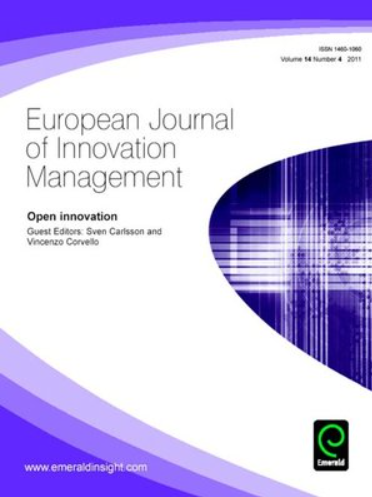Digital job resources, digital engagement, digital leadership, and innovative work behaviour: a serial mediation model
IF 5
3区 管理学
Q1 BUSINESS
引用次数: 0
Abstract
PurposeDrawing on the Job Demands-Resources (JD-R) theory, the primary goal of this study is to conceptualise and empirically validate a theoretical framework that explains the process by which digital job resources influence the innovative work behaviour of technological professionals. Specifically, this study aims to examine the impact of digital job resources, especially digital training, and digital communication, on employee digital engagement. Furthermore, it investigates the influence of digital engagement on digital leadership and the effect of digital leadership on innovative work behaviour. Lastly, the study examines whether digital engagement and digital leadership serially mediate the relationship between digital job resources and innovative work behaviour.Design/methodology/approachData were collected from full-time technological professionals using multiple sampling techniques. A total of 307 samples were utilised for the final data analysis. Partial Least Squares Structural Equation Modelling (PLS-SEM), employing SmartPLS 4.0, was used to test the study hypotheses.FindingsThe findings of this study emphasize that digital engagement and digital leadership are pivotal in mediating the impact of digital communication on technological professionals' innovative work behaviour. Specifically, our results show that digital communication significantly shapes the digital engagement of these professionals. Digital engagement, in turn, positively influences digital leadership, which then fosters technological professionals’ innovative work behaviour. Notably, both digital engagement and digital leadership serve as mechanisms that link digital communication and innovative work behaviour. Contrary to our initial expectations, the study finds that digital training neither directly affects digital engagement nor has an indirect effect on innovative work behaviour.Originality/valueThe present study is distinct in offering a theoretical framework outlining the steps through which digital resources influence technological professionals' digital engagement, digital leadership capabilities, and their innovative work behaviour. Prior studies have predominantly focused on antecedents of innovative work behaviour, with an emphasis on individual characteristics and organisational environmental factors. There is limited research exploring how, or even if, digital job resources – such as digital training and digital communication – affect employees’ innovative work behaviour. Additionally, the examination of the interrelationship between digital engagement and digital leadership is notably lacking in existing literature. Much of the research has instead probed the converse relationship: how leadership styles impact employees' engagement. Lastly, this research is among the pioneering efforts to consider the serial mediating role of digital engagement and digital leadership between digital job resources and innovative work behaviour, a topic that remains underrepresented in academic discourse. This study addresses these gaps.数字化工作资源、数字化参与、数字化领导力和创新工作行为:串联中介模型
目的本研究以工作需求-资源(JD-R)理论为基础,主要目的是构思并通过实证验证一个理论框架,解释数字工作资源对科技专业人员创新工作行为的影响过程。具体来说,本研究旨在探讨数字化工作资源(尤其是数字化培训和数字化交流)对员工数字化参与的影响。此外,本研究还探讨了数字敬业度对数字领导力的影响,以及数字领导力对创新工作行为的影响。最后,本研究还探讨了数字敬业度和数字领导力是否会对数字工作资源和创新工作行为之间的关系起到连续的中介作用。最终数据分析共使用了 307 个样本。采用 SmartPLS 4.0 建立的部分最小二乘法结构方程模型(PLS-SEM)对研究假设进行了检验。研究结果本研究的结果强调,数字参与和数字领导力在数字通信对科技专业人员创新工作行为的影响中起着关键的中介作用。具体而言,我们的研究结果表明,数字通信在很大程度上影响了这些专业人员的数字参与度。数字参与反过来又对数字领导力产生积极影响,进而促进科技专业人员的创新工作行为。值得注意的是,数字参与和数字领导力都是连接数字通信和创新工作行为的机制。与我们最初的预期相反,本研究发现,数字化培训既不会直接影响数字化参与,也不会间接影响创新工作行为。 原创性/价值 本研究与众不同之处在于提供了一个理论框架,概述了数字化资源影响科技专业人员的数字化参与、数字化领导能力及其创新工作行为的步骤。之前的研究主要关注创新工作行为的前因,重点是个人特征和组织环境因素。探讨数字工作资源(如数字培训和数字通信)如何甚至是否会影响员工的创新工作行为的研究十分有限。此外,现有文献明显缺乏对数字化参与和数字化领导力之间相互关系的研究。大部分研究都在探讨反向关系:领导风格如何影响员工的参与度。最后,本研究是考虑数字工作资源和创新工作行为之间数字敬业度和数字领导力的系列中介作用的开创性研究之一,而这一话题在学术讨论中的代表性仍然不足。本研究填补了这些空白。
本文章由计算机程序翻译,如有差异,请以英文原文为准。
求助全文
约1分钟内获得全文
求助全文
来源期刊
CiteScore
10.40
自引率
17.60%
发文量
107
期刊介绍:
The subject of innovation is receiving increased interest both from companies because of their increased awareness of the impact of innovation in determining market success and also from the research community. Academics are increasingly beginning to place innovation as a priority area in their research agenda. This impetus has been partly fuelled by the Economic & Social Research Council (ESRC) who have designated innovation as one of nine research areas in their research initiative schemes.
文献相关原料
| 公司名称 | 产品信息 | 采购帮参考价格 |
|---|

 求助内容:
求助内容: 应助结果提醒方式:
应助结果提醒方式:


